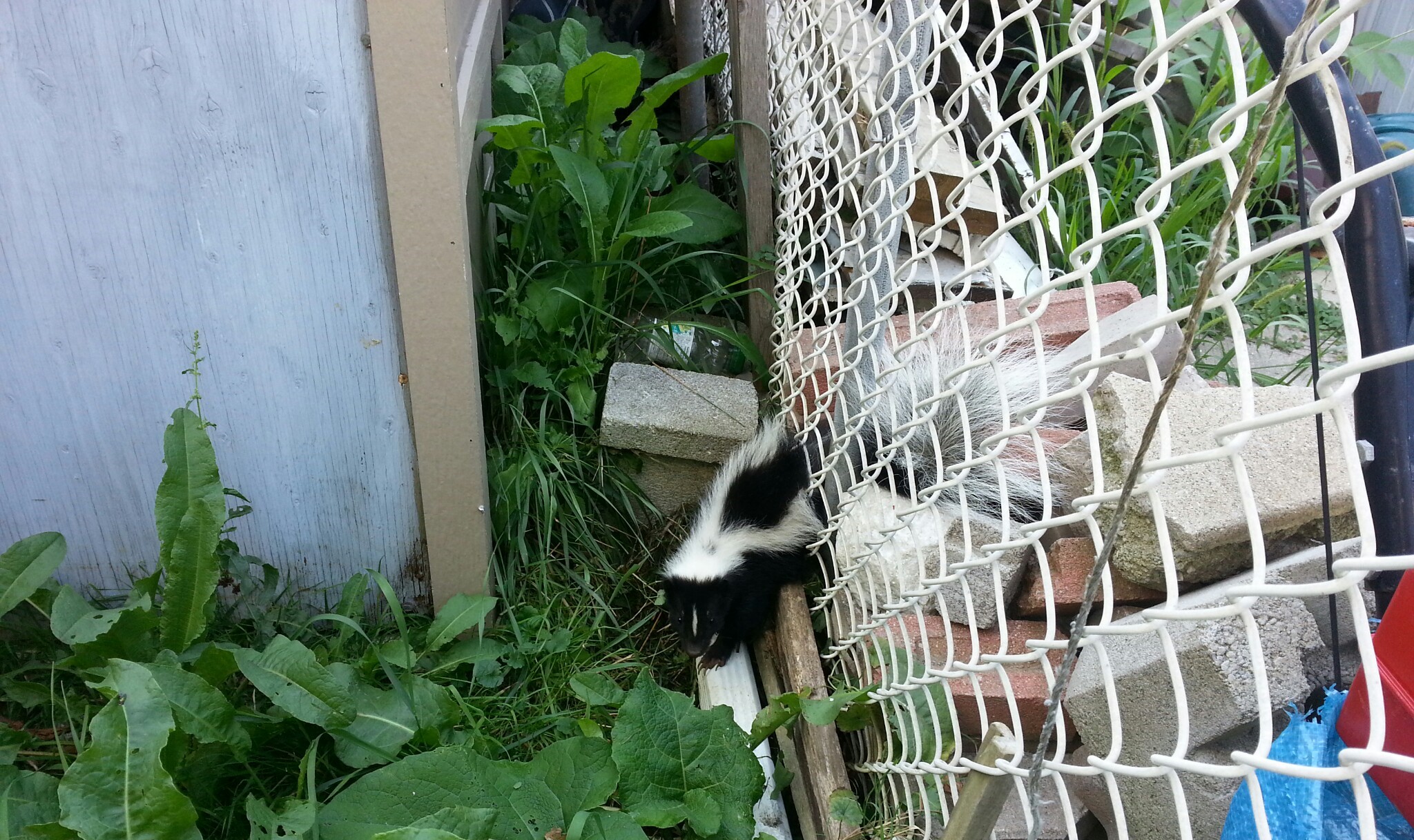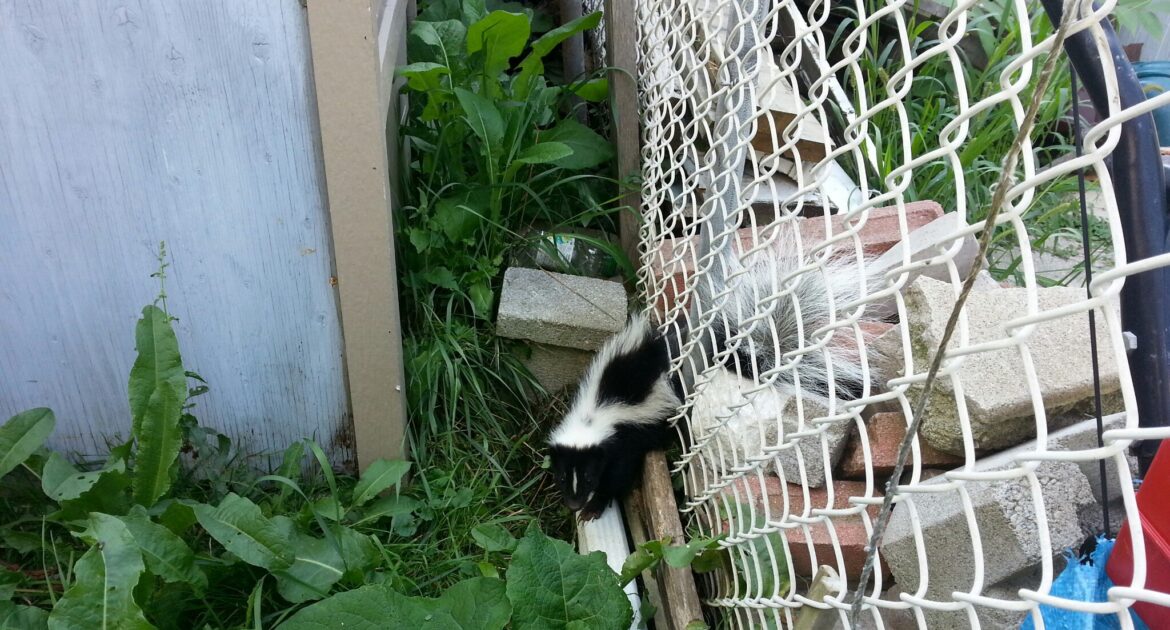Wildlife control in Whitby is important for maintaining a safe and healthy environment for both people and animals. One common issue that residents face is dealing with skunks. Many people wonder, are skunks dangerous? While skunks are typically not aggressive, they do have sharp teeth and claws that can cause injury if they feel threatened. So, the short answer to “Can skunks bite?” Is Yes!
It’s essential to address any skunk problems with care and professionalism to avoid potential harm. Understanding how to get rid of skunks safely is crucial. Engaging professional services ensures that these animals are handled humanely and effectively, minimizing the risk of bites or other issues.
Skedaddle’s wildlife experts in Whitby are trained to manage these situations with the utmost care, ensuring that both the skunks and the homeowners remain safe. Our methods typically involve assessing the situation, identifying entry points, and using humane techniques to encourage skunks to vacate the area.
By relying on our skilled professionals, you can rest assured that your skunk problem will be resolved efficiently and ethically. Protecting your property while respecting the local wildlife is a balance that is best achieved through expert intervention. Trust Skedaddle to manage skunk issues with expertise and care.
Understanding Skunks
Skunks are fascinating animals that many people don’t fully understand. Known for their striking black-and-white appearance, they are recognized primarily for their defensive spray. This odorous liquid is their main line of defence against predators, including curious household pets. But what about biting? While skunks are generally not aggressive, they can bite if threatened or cornered. This is why understanding their behaviour is important for homeowners concerned about wildlife control in Whitby.
Skunks are nocturnal, meaning they are most active during the night. They typically forage for food at dusk and dawn, looking for insects, small mammals, and garbage that might be left out by homeowners. Their presence is often first noticed by the unmistakable smell they leave behind. However, before resorting to their smelly defence, skunks will warn with a variety of signals. They might stamp their feet, raise their tails, and hiss before they release their spray. If these warnings are ignored, and they feel trapped, a skunk might bite as a last resort. Understanding these signs can help you avoid unnecessary encounters.
Another aspect of skunk behaviour is their preference for certain habitats. They often seek shelter under decks, sheds, or porches—places that offer safety and protection. Unfortunately, these areas are usually close to human residences, increasing the chances of human and skunk interactions. Homeowners may unknowingly encourage skunks by leaving out pet food or unsecured trash. By making minor adjustments, such as securing garbage bins and removing food sources, you can reduce the likelihood of skunks making your property their home. However, for a guaranteed solution, professional wildlife control services are often necessary.
Are Skunks Dangerous?
The question “Are skunks dangerous?” is common among homeowners who discover skunks on their property. While skunks are not naturally aggressive, there are certain risks associated with them. The primary concern is the possibility of disease transmission. Skunks are known carriers of rabies—a viral disease that affects the nervous system of mammals, including humans. If bitten by a skunk, it’s essential to seek medical attention immediately due to the potential risk of rabies.
Besides rabies, skunks can also carry other diseases such as leptospirosis and canine distemper. Leptospirosis is a bacterial disease that can be transmitted to humans through contact with water or soil contaminated with the urine of infected animals. Canine distemper, on the other hand, affects dogs and can be transmitted from skunks to unvaccinated pets. Therefore, it’s crucial to be cautious and keep your pets’ vaccinations up-to-date if skunks are present in the area.
While skunks do have the potential to bite if cornered, their spray is their most significant defence mechanism. The spray is not dangerous in terms of severe health effects, but it can cause temporary blindness and irritation if it gets into the eyes. Additionally, the lingering odour can be difficult to remove from skin, clothing, and pets. This makes encounters with skunks particularly unpleasant, further necessitating effective wildlife control measures to prevent these situations.
How to Get Rid of Skunks Safely
When dealing with skunks, it’s essential to prioritize safety—for both humans and the animals involved. Skunks, despite their reputation, play a role in controlling insect populations and are an integral part of the ecosystem. Therefore, humane methods are the preferred approach when deciding how to get rid of skunks.
One effective strategy is habitat modification. By removing potential food sources and sealing entry points under porches or decks, you can make your property less appealing to skunks. Ensuring that garbage is securely stored and pet food is not left outside can significantly reduce the attraction for skunks. Additionally, consider using motion-activated lights or sprinklers as deterrents, as skunks prefer dark, quiet environments.
If skunks have already taken residence on your property, professional wildlife control services are the best option. Companies like Skedaddle are experienced in humane removal techniques that ensure the safety of both the skunks and the homeowners. These professionals can assess the situation, safely remove the animals, and implement measures to prevent future occurrences. They also offer advice on how to maintain a skunk-free environment.
Trained To Handle A Variety Of Wildlife
At Skedaddle, we understand the challenges homeowners face when dealing with wildlife issues. Our approach combines expertise, humane practices, and effective solutions to provide peace of mind to our clients. We pride ourselves on being a reliable partner in wildlife control in Whitby, ensuring that your home remains safe and wildlife-free.
Our team of experts is trained to handle a variety of wildlife situations, including skunks. We use techniques that prioritize the well-being of the animals while protecting your property. From initial assessment to animal removal and prevention measures, every step is handled with professionalism and care. Our commitment to humane practices sets us apart, as we believe in respecting wildlife while providing effective solutions for homeowners.
Additionally, Skedaddle offers personalized service tailored to your specific needs. We understand that every situation is unique, and we work closely with you to develop a plan that addresses your concerns. Whether it’s a skunk problem or any other wildlife issue, our goal is to provide efficient, long-lasting solutions. Choosing Skedaddle means choosing a partner who values expertise, reliability, and humane practices in wildlife control.
Humane Approach
In conclusion, while skunks are generally not aggressive, they can become a concern for homeowners, especially when they feel threatened. Understanding skunk behaviour, potential dangers, and effective removal strategies is crucial for maintaining a safe and comfortable home environment. By implementing preventive measures and seeking professional assistance when necessary, you can ensure that skunks do not become a recurring problem.
At Skedaddle, we’re here to help you with all your wildlife control needs. Our professional and humane approach ensures that skunks and other wildlife are managed effectively, providing you with peace of mind. If you suspect skunks on your property or want to prevent future wildlife issues, contact Skedaddle today. Our expert team is ready to assist you in keeping your home safe and wildlife-free. Don’t wait—take proactive steps to protect your property and enjoy a skunk-free environment.




